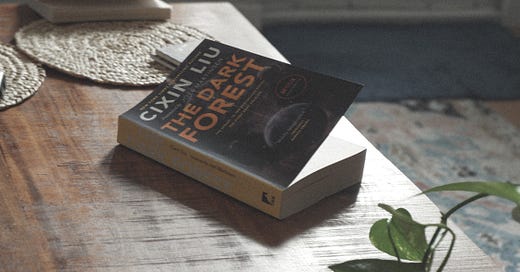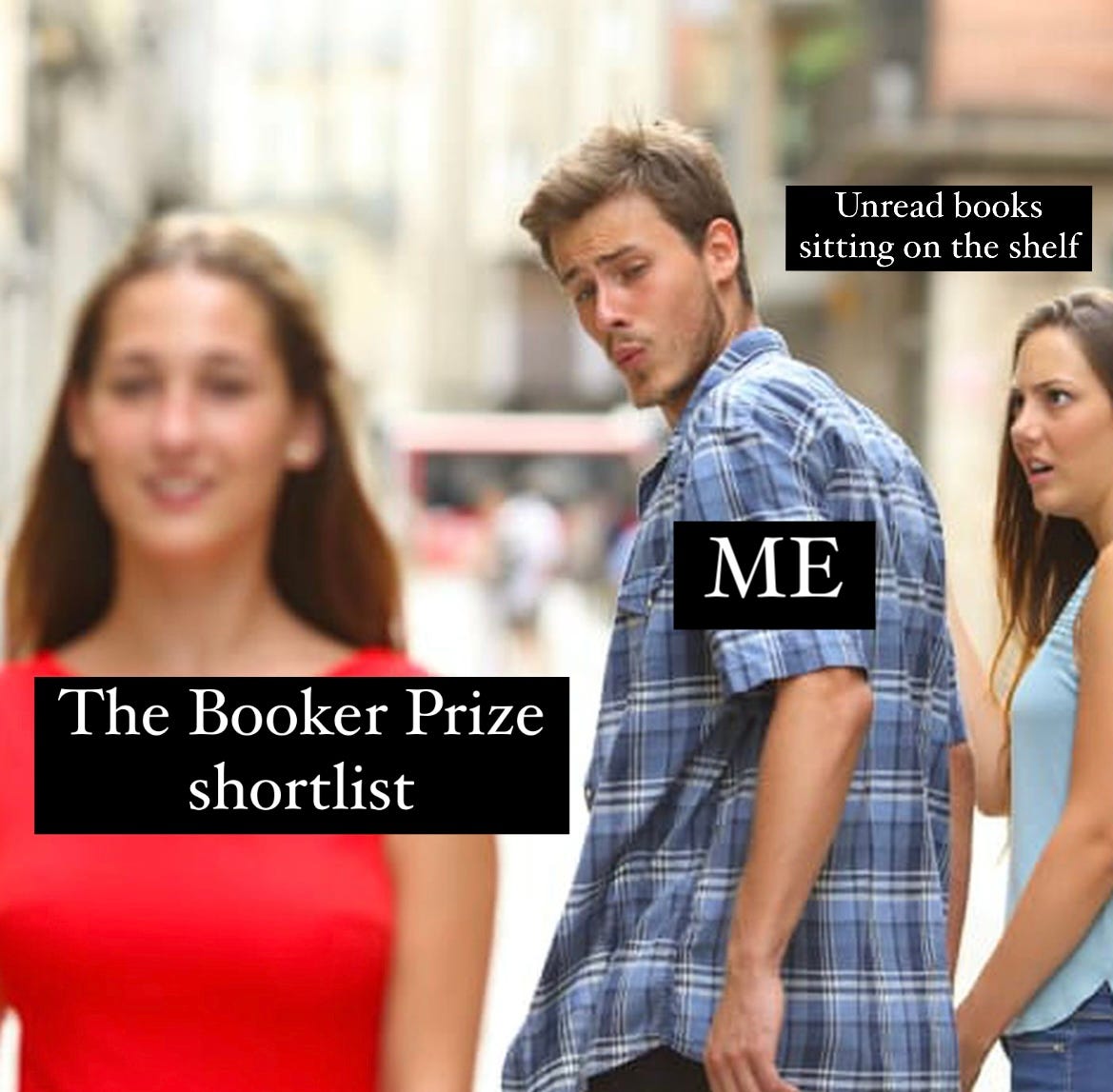Dear Reader,
Did you see the eclipse? Wasn’t it magnificent? I, myself, was so wrapped up in my puny mortal life that I was ignorant of the cosmic events unfolding, so, I’m immensely thankful to my friend who suggested driving an hour from Ottawa to witness the total eclipse. People cheered as the Moon covered the Sun, leaving us in darkness, and they cheered again as the Sun came back, as if it needed encouragement and support. It was a beautiful moment, made all the more poignant by the fact that I was reading Liu Cixin’s space opera trilogy. Two books down, one to go.
In the more literary news of the week, the International Booker Prize announced this year's shortlist: six books from six different languages. I have half a mind to start reading the finalists, but I’m also half-ashamed to do so since last year’s winner is still sitting on my bookshelf, unread. The winner will be announced on May 21st. I don’t have much time so if I want to embark on that quest, I should start reading this week.
Anyway. Down to business.
The stories that carried me through this week:
The Dark Forest (book 2 in the Remembrance of Earth's Past trilogy):
I have mixed feelings about this book. I still don’t know my overall take on it, but I’m sure that by the end of this letter, I will come to a conclusion. In discussing the book, I will also be spoiling some of the ideas and concepts. I won’t talk in length about the plot lines, but beware all ye who enter here.
In general, this book was so hard for me to get through, even more difficult than the first book, since it is longer. I loved the Prologue, but the rest of Part 1 was a bit rough. Since the first season of The 3-Body Problem covered the Prologue with some changes, I knew what was happening and put my focus on looking for the underlying symbolism and metaphors. Just like the first book, the Prologue sets the tone and foundation for the rest of the story. The main ideas of The Dark Forest are hidden in these pages. However, later on, many characters are introduced which kills the rhythm of the story and honestly, I don’t think were necessary. There’s also a part where the main character, Luo Ji, dreams up the perfect woman and falls madly in love with her, which is excruciatingly long. Like, do we really need every little detail of those imaginary dates?
Absurdly enough, later in the story this imaginary lover is found for our protagonist and brought to him in his Garden of Eden. I won’t get into the details of what and why and how, but the description of the protagonist’s love interest is at best nauseating, and at worst, quite disturbing. You can see the common problem of women being written by men here, with the difference that instead of breasting boobily, the female character is repeatedly described as being “like a child” who is “helpless,” “innocent,” easily startled by the world, and needs protection. Liu Cixin’s treatment of gender could be the subject of a lengthy essay, but I will leave you with one quote and move on to the good parts. This quote is from a scene where Luo Ji’s head of security, Shi Qiang, is trying to get a grasp on Luo’s imaginary lover so he can find a real version of her for his boss.
After he finished Shi Qiang stubbed out his cigar. “[…] I’ll guess a few things about the girl, and you see if I’m right.”
“Great!”
“Education: She’s got at least a bachelor’s, but less than a doctorate.”
Luo Ji nodded. “Yes, yes, she’s knowledgable, but not to the point where it calcifies her. It only makes her more sensitive to life and to the world.”
Lou Ji himself, of course, has a PhD. No pun intended.
OK. Now, the good stuff.
The first book in the trilogy presents a significant threat to humanity’s survival: a huge fleet of aliens is coming to destroy us. Now, the second book discusses how humans attempt to solve this problem, offering insights into the depths of our species’ psyche. One might assume that due to such a grave threat to our survival, humanity would definitely unite and set aside all things that divide us. Alternatively, one might think the exact opposite—that such an enormous threat tears us apart. But regardless, the darkest traits of humanity will manifest themselves here.
There are two main ideas discussed in the book, proposed as axioms upon which the study of interactions between different intelligences in the universe could be based. The first one is that the primary drive of every civilization is to ensure its survival. The next one is that while life grows and multiplies, the amount of resources in the universe is limited. The concepts that follow from these axioms are that every civilization advanced enough to discover life in other parts of the universe will always want to destroy the other one for the reasons stated above: one, to hijack their resources for themselves and grow even more, and two, to ensure that the other civilization won’t attack them—there’s always a “chain of suspicion” between them.
What captivates me the most about sci-fi is how, by presenting us with the most far-fetched plot lines, it delves so deeply into the soul of humanity. The human traits that Liu sheds light on in this book and the one before in the series are honestly very dark. But I often wonder if it is time for us to be brutally honest with ourselves, to take a good look in the mirror and let go of the romantic notions we have of humanity. At this point in history, after everything humans have done to each other, after the ongoing wars in the world at the moment, after the blood of so many children being shed while the rest of the world watches, there’s no denying that we are capable of high degrees of cruelty and violence. We can call it evil. We can call it human nature. But we cannot ignore it. And Liu does such an awesome job of showing this brutality in different scenarios, in different periods.
As I discussed in my previous post, the first book comments on the violence we’re capable of and the pain we inflict on others so easily. Book one starts with the cruel persecution of scientists and academicians, but in so many ways, book two is a continuation of that thread. The nature of the threat has changed, but the result is the same. In The Dark Forest, the author shows how easily the heroes can become the foes and vice versa, and how ruthless we can become towards the disgraced heroes. So my question is, is the brutality that we see in our society, without the looming threat of aliens, of the same nature that we see in The Dark Forest? How can we address these problems without falling into nihilism and hating the animal within, while at the same time not dismissing everything as merely human nature?
There’s so much more that I want to say about this book but it’s already five in the evening and I need to send this letter away. I would like to read The Dark Forest at least two more times, and normally any book that convinces me of a second reading gets at least four out of five stars. Then I think now I know how I feel about the book. I am frustrated by it, but that does not compare with how much I loved reading it—especially Parts 2 and 3. I feel like I just want to keep talking about it, and I wish I had people around me who were going through a 3-Body phase with me, but I guess I just have to content myself with virtually connecting to the nerd-vine.
Other stories this week:
I started the third book in the trilogy, Death’s End. This one started on a high note from the beginning. I’m also midway through Annihilation, Jeff VanderMeer’s sci-fi horror story—it’s intriguing, creepy, Lovecraftian, and easy to read, and has wreaked havoc on my dreams. I can’t wait for the monster to show itself.
That’s all from me!
Have a great weekend,
Fatemeh






